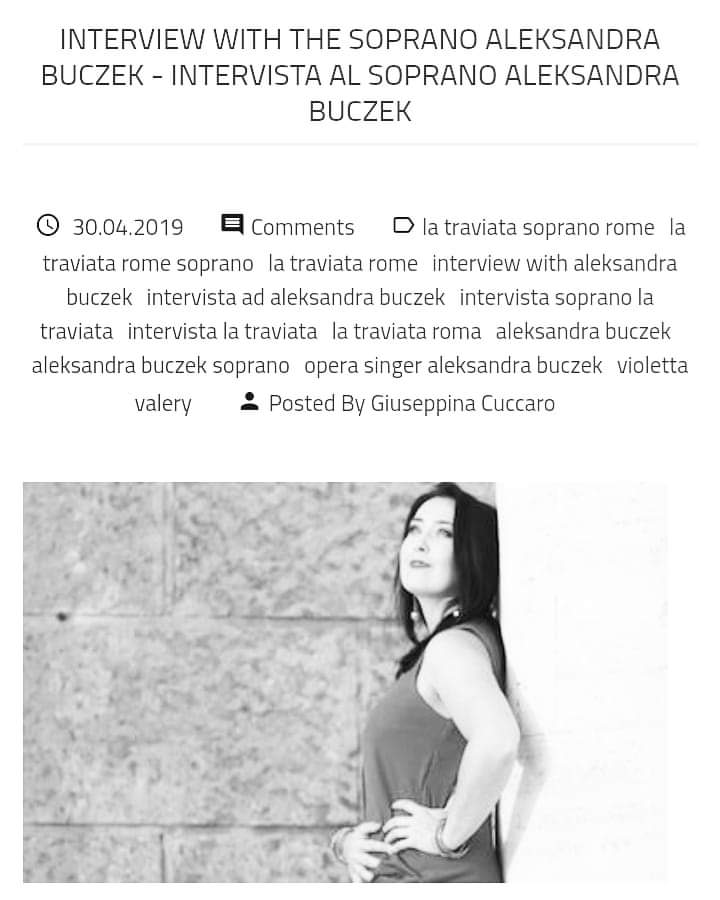10. set, 2021
Intervista al soprano Aleksandra Buczek posted by Giuseppina Cuccaro
English translation below
La tua voce ha già fatto il giro dei teatri di tutta Europa. Cosa ti ha spinta a stabilirti a Roma?
Sono venuta a Roma con una piccola valigia quasi 4 anni fa per fare una Masterclass, dei concerti e delle lezioni private con il celebre soprano ungherese Sylvia Sass. Posso dire che Sylvia Sass è stata la persona più importante nel mio percorso artistico, una fonte d'ispirazione enorme per lo sviluppo della mia personalità. Pensavo di restare in Italia 3/4 mesi, invece, quasi subito, ho trovato l'amore, mi sono innamorata felicemente e non sono più tornata in Polonia, provando a costruire la mia vita qui a Roma. Poi ovviamente mi sono innamorata anche della città - non credo ci sia una persona su questo pianeta che possa dire che Roma non sia bellissima.
L'espressione "soprano drammatico d'agilità" fu coniata nel 1949 per descrivere la voce di Maria Callas, una delle più celebri interpreti de La Traviata di tutti i tempi. Pensi che avere il dono di questa voce ti abbia destinata al ruolo di Violetta?
Soprano drammatico d'agilità significa avere i tre tipi di voce: drammatico, lirico e leggero in una. Signifca avere l'espressione del soprano drammatico ma con le caratteristiche del soprano lirico - agilità, facilità negli acuti e nella coloratura. In realtà l'unico compositore che scriveva le opere per le voci con queste caratteristiche fu Giuseppe Verdi. Ecco perché questo tipo della voce viene chiamata "soprano verdiano".
Il ruolo di Violetta Valery, come il ruolo verdiano, ha bisogno di questi tre tipi di voce: soprano leggero per l'atto I, lirico - drammatico per gli atti II e III. Solo così è possibile ottenere credibilità in tutto il ruolo dall'inizio alla fine. Ho scoperto che Verdi è il compositore perfetto per la mia voce perché posso dimostrare tutte le mie possibilità dai suoni bassi a quelli scuri, tra agilità e colorature fino al mi bemolle.
Qual è la sfida più grande nell'interpretare questo ruolo?
La sfida più grande, personalmente, è stata comprendere il personaggio di Violetta Valéry. Il suo carattere è lontano dal mio. Io sono un tipo combattivo, forte, mi piacciono le guerriere come Norma oppure Abigaille. Era davvero difficile accettare il personaggio della cortigiana. Ma alla fine, noi cantanti, siamo anche degli attori. La nostra bravura è essere credibili. Dal punto di vista drammatico preferisco gli altri ruoli, ma musicalmente "La Traviata" è un bell'esercizio tecnico. Se la canti spesso e finisci con la gola fresca significa che sai le cose bene. Grazie ad Opera e Lirica per questa splendida opportunità.
Cosa rende La Traviata un'opera intramontabile che viene sempre accolta dal pubblico con emozione ed entusiasmo?
La musica! Non esiste un'altra risposta. La musica è geniale dall'inizio alla fine. Verdi fu un genio. La sua musica è sempre profondamente unita con le parole, la scelta degli strumenti, dei colori... Ricordo che una volta Sylvia Sass mi raccontava una memoria d'infanzia, quando al teatro ha sentito i primi suoni dell'introduzione e ha chiesto subito "Ma perché i violini piangono?". Tutto qui. Piangono perché Violetta morirà, sarà troppo tardi per la felicità, che comunque non voleva.
Com'è stato l'incontro con la soprano Inés Salázar nel 2017 e il conseguente invito a partecipare al concerto delle musiche di Verdi e Bellini?
È stato bellissimo! La sua voce mi è sempre piaciuta molto, bellissima, scura, come il velluto. Non sapevo che Ines Salazar vivesse a Roma e quando ho scoperto la pubblicità del Masterclass con lei, non avevo dei dubbi che dovessi andare ad incontrare questo soprano meraviglioso.
C'è qualche altra celebre soprano che ti ha ispirata nel tuo perfezionamento artistico?
Karan Armstrong. Voce stupenda, persona straordinaria. Abbiamo fatto degli incontri a Berlino, dove abitava. Mi diceva sempre che la mia voce è senza limiti e con il tempo sicuramente sarei arrivata al repertorio più drammatico, più avanzato. Sono fortunata perché trovo sempre la persona giusta al momento giusto, quando sono davvero pronta per imparare le cose. Mi piace imparare. Il mio desiderio più grande è sempre stato sviluppare la mia voce. Questo mi rende felice.
Invece, cosa ti ha ispirata ad avvicinarti al canto lirico? Da bambina sognavi già di diventare ciò che sei diventata?
Mia mamma mi raccontava che quando era incinta di me sentiva il bisogno di cantare "Un bel di vedremo" ogni giorno. Una cosa molto particolare, perché nessuno nella mia famiglia cantava l'opera, lei conosceva questa aria soltanto perché è famosissima. Mio papà suonava degli strumenti, cantava e mi insegnava la musica. Scappavo da scuola per poter tornare a casa e suonare. Da piccola sentivo che la musica era tutto il mio mondo. A 8 anni, per la mia prima comunione, ho cantato per la prima volta in chiesa e poi ho cantato per anni a tutti i matrimoni le Ave Maria di Bach e di Schubert. Era naturale per me.
Se un neofita ti chiedesse perché venire a vedere un concerto d'opera, cosa gli risponderesti?
Perchè puoi viaggiare come su una vera e propria macchina del tempo: è viaggio straordinario nella storia, con il linguaggio più incredibile al mondo: la musica.
ENGLISH
Your voice has already toured all Europe. What drove you to move to Rome?
I came to Rome with a small luggage almost 4 years ago to attend masterclasses, perform concerts and attend private lessons with the famous Hungarian soprano Sylvia Sass. She has been a crucial person in for my artistic evolution, and a source of enormous inspiration for the development of my personality. I thought I would stay in Italy for 3/4 months, but I found love almost immediately. I happily fell in love and I decided to stay and try to live my life here in Rome. Then I obviously also fell in love with the city – I don't believe any person on the planet would say that Rome is not beautiful.
The term "soprano drammatico d'agilità" was coined in 1949 to describe Maria Callas' voice. She was one of the most famous performers of La Traviata of all times. Do you think being gifted with this voice naturally led you to Violetta's role?
Soprano drammatico d'agilità means having the three types of voice, the dramatic soprano, lyriic soprano and the coloratura soprano, all in a single voice. That means the expression of the dramatic soprano, with the characteristics of the lyrical soprano and the coloratura, ornamentation of the melody. Actually, the only genius who composed operas for this kind of voices was Giuseppe Verdi. Indeed, this kind of voice is also called "soprano verdiano".
The role of Violetta Valery needs the three types of voice: coloratura for act I, lyrical and dramatic for act II and III. I found out that Verdi is the perfect composer for my voice because I can use all range of sounds from low-pitched sounds, to ornamentation and up to E flat.
What's the greatest challenge in interpreting this role?
My greatest personal challenge has been the effort to convince myself to believe in the character of Violetta Valéry. Her personality is quite different from mine. I feel more similar to warrior women like Norma or Abigaille. It was very difficult to accept the character of the courtesan. But obviously, singers also need to be actors. Our professionalism depends on our acting skills too. From the dramatic point of view, I personally prefer other roles, but, as far as music is concerned, "La Traviata" is a nice technical exercise. If you sing it often and your throat is still fresh at the end of the opera, it means you are doing a good job. Thanks to Opera e Lirica for this wonderful opportunity.
What makes La Traviata a timeless opera that is always greeted with the audience's emotion and enthusiasm?
The music! There cannot be another answer. The music is brilliant from the beginning to the end. Verdi was a genius. His music is always united with the words, the choice of the instruments and colours... I remember Sylvia Sass telling me a childhood memory. When she heard the first sounds of the introduction to La Traviata at the opera house, she immediately asked: "Why are the violins weeping?". That's it. They weep because Violetta is going to die, it will be too late for the happiness she did not even actually want.
How was the meeting with the soprano Inés Salázar in 2017 and the following invitation to take part in the concert of Verdi and Bellini's music?
It was great! I have always loved her voice, it's beautiful and warm as velvet. She is an incredible woman, a fantastic Tosca and Aida. I did not know that Inés Salazar lived in Rome and, whan I saw the advertisement of her Masterclass, I had no doubts that I had to go and meet this wonderful soprano.
Is there any other famous soprano inspiring your artistic career?
Karan Armstrong. A wonderful voice, an extraordinary person. We met some times in Berlin where she used to live. She always told me that my voice is limitless and that I would be able to perform the more dramatic and advanced repertoire. I am lucky because I always find a person at the right time, when I am really ready to learn things. I like learning. My greatest desire has alawys been developing my voice. That's what makes me feel happy.
Instead, what inspired you to approach opera singing? As a child, did you already dream of becoming what you have become?
My mother told me that when she was pregnant with me she felt the need to sing "Un bel di vedremo" every day. It was a peculiar thing, since nobody in my family sang the opera, she just new the aria because it is very famous. My father used to play instruments, sing to me and teach me music. I used to escape from school to come back home and play music. As a child, I felt music was my whole world. At the age of 8, for my First Communion, I sang in church for the first time. Since then, I sang in church for years at all weddings, Ave Maria by Bach and Schubert. It came naturally.
If a neophyte asked you why he should come to see an opera concert, what would you tell him?
If you want to travel with a real time machine, come and enjoy the extraordinary journey through history and time, with the most wonderful language in the world – a language without words – music.

